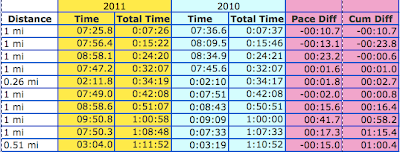by Jeff Walker –
Just run, baby
Ever since my first Mt. Washington, I’ve been intrigued by the performance differences between running and walking steep climbs. Without diving into the research, I did my own experiment (non-randomized, two replicates that are confounded with year) using the summit trail of the Bradbury Mt. Breaker. First, here are my splits from 2010 and 2011. The 2010 splits come with an asterisk as I went off-course for 2:41 but I’ve removed that from all the data below (I’m still trying to hack into cool running so I can remove it from the results as well).
The first two miles were respectably faster this year than last year (a goal). During the first mile I felt like I was going the correct pace but I was questioning this because a group that I knew I’d be passing started even faster than I. By 3 miles (1/2 mile over the top of the summit) I had lost the time gain and was dead-even with the previous year and basically maintained this through the first 5.25 miles. The next three miles, and especially the 2nd climb up the summit trail were painfully slow compared to last year. The only bright spot over the last 3.5 miles was the last 1/2 mile which I first was pushed by and then pulled by Jeremy, who I was glad to have along for the ride to the finish.
The major difference between years seems to be the summit trail. Last year I ran almost all of the summit trail on lap one and most on lap two. This year I had decided to walk most of the summit trail and save my energy for the descent. Part of my reasoning came from talking to others and part came from a paper that I had read that used O2 consumption data to argue that runners climb too quickly and descend too slowly (of course these were on grades of only a few % – not 25-40% like the summit trail).
What was interesting, and I noticed during the race and commented on to several people afterwards is that I didn’t feel any fresher after having walked the summit trail than after running it last year (at least as far as I can remember last year). Running it slowly or walking it quickly doesn’t matter; the summit trail is a lung buster.
So I looked at my splits climbing the summit trail (starting a wee past the aid station) and the 3/4 mile descent down the other side to see if walking the summit trail allowed me to descend faster (unlike the switchback or S. Ridge trail, the Tote Rd? descent from the summit can be as fast as you want it to be). Here are the data:
On the first ascent, in which I ran the flatter sections and made the effort to walk the rest, I lost 8s to 2010. But then I lost 16 seconds on the descent! The second time around, in which I walked all of the summit trail, I lost a whopping 17 seconds on the climb and still lost 6 seconds on the descent. So these data suggest that no, walking not only slowed me down going up but slowed me down further going back down!
I talked to Judson Cake after the race and asked if he walked any of the summit trail and he said no, only because he finds it hard to transition back into running. The 2 sec that I walked at Mt. Washington in 2009 I had the same feeling, and decided I’d be faster running the whole thing. Is there something physiological to this or is it only mental (yes I recognize that mental is physiological but I know what I mean). One caveat to these results is that I never walk in races because I don’t really do any races that this is necessary. So I never practice fast hiking and in fact Jamie, and Ian, and Stephen, and probably everyone else are much faster hikers than I. So maybe an experienced fast hiker would have different results but I’m not practicing fast hikes for 5 minutes of one race. I’d rather just run, baby.


